#this entire song is so so stronger in hebrew
Text
There's a lot of ways in which the Prince of Egypt Hebrew Dub is even better then the original, but today I'm thinking specifically of how instead of asking Hashem to get us to the Promised Land, the words are Eretz Ha'Avot- the Land of our Fathers
This isn't about what we were promised. It's about what we had and lost.
235 notes
·
View notes
Photo

A LETTER TO FRIENDS OF THE DESERT - Marcello Tarì
First published in Qui e Ora, March 20, 2020.
My dear friends,
There are few things in life more comforting at a time like this than writing letters to your dearest friends. I hope this one finds you as healthy and beautiful as I carry you within me. Some of us are living with great suffering these days, but friendship - that is, being as close as possible to one another - makes it possible for us to share and therefore diminish this suffering if we wish. This is simply because, by virtue of friendship, we are effortlessly led to live with each others' lives. In this cloister which has taken us in, we must remain open as never before to the wind of friendship which, as we know, is capable of blowing beyond any distance.

As you may have noticed, we have found ourselves, for a few days or weeks depending on our respective countries, reduced to a quarantine in a time which, in a disturbing coincidence, is also that of Lent, a time traditionally devoted to introspection, to renunciation, and perhaps in the end to reconciliation. As anyone who knows me well can attest, I have always thought that there is no such thing as “chance”, and that “chance” was only a way of speaking to reassure ourselves, a superstition with which we force ourselves to believe that what happens, and the way it happens, has no meaning for us. So I thought this coincidence to be part of the signs of the times that we are called to interpret.
In the Gospels it is told that during this time Jesus was "driven" by the Spirit into the desert for forty days, and that there, in this period of asceticism, he suffered the temptations of the devil.
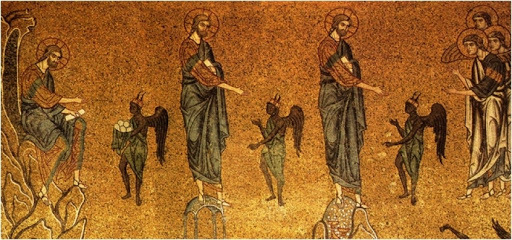
This is a topos that can be found in several stories of the Old Testament, beginning of course with the adventurous journey of the Jewish people to flee persecution. Different stories, but all signs that the desert is a "trial" [prova]. Of course, the life of each of us has passed through desert periods. It does not always go well, and we bear the scars. At least, that has been my experience. But those times when we did come out of it stronger are the ones that, when you think about it, allow us to still be alive. The exceptional thing is that sometimes, as today, the test is at once individual and collective, to the point of involving entire peoples, if not all of humanity.
We who have always scrutinized the inexorable flow of history, looking for the signs of the event that would interrupt it, therefore cannot stand still in the face of what is happening. An extraordinary event, which makes us realize that we don't have enough words to describe it. The desert is also the absence of words, speeches, repetitive and pleasant sounds. Moreover, in Hebrew, the term used for "word", dabar, and that for "desert", midbar, have the same root: from this, we can assume that it is precisely because the desert is a place deprived of words that it is most conducive to the revelation of the Word as an event. The first thing to do, then, is to listen, to tidy up inside oneself enough to be able to welcome the event. But to listen to what, exactly? In an interview with a nun I recently read, she says that obedience is to be understood in its etymological sense, as ob-audire, "to listen before, in front of". "Listening to reality" is the true meaning of obedience, she concluded in her cloister. I believe it is an exercise of this kind that the period calls for.

In the desert there are no streets, no paths that have already been traced out and need only to be followed. It is the task of those who cross it to orient themselves and find their own way out. There are no shops, there are no sources of water, there are no plants. Everything appears motionless because in the desert there is no production. There are no bars, and there are no social centers. There is nothing that we would imagine there to be in a place considered “livable”. We can say in the end that there is nothing human, and that is why in the book of Deuteronomy it is said that in the desert there is a screaming loneliness. I know very well that a great part of this time we are living through seems to be made essentially of this screaming and dehumanization, and I understand the distrust and horror in which we are sometimes captured and led to despair. The vulgarity of so much of the "music" that falls in the early evening from Italy’s balconies these days does not manage to cover this scream - the scream covers everything. In fact, after the euphoria of the first days, this ritual is already disappearing: many understand that it doesn't quite sound right. Changing the scream into a song depends on our sensitivity, our tuning to the event. No, we must not twist in despair or freeze in denial. There are many ways of despairing and denying, and often, in the turmoil of which they are made and which they convey, they seem to be opposites. Let’s not be fooled. Let us truly listen to the song of reality.
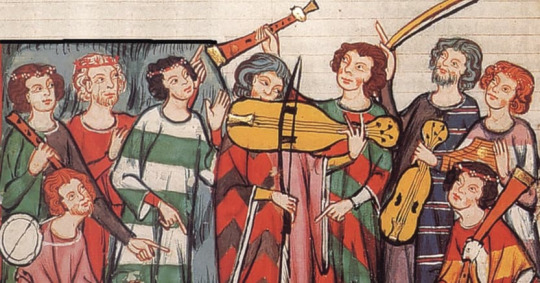
One must think of how, in those old books, it is said that the Garden of Eden was the first victory over the desert chaos. That it was in fact planted in the center of where there was nothing, neither bushes nor grass, neither river nor anything else. It has indeed remained unforgettable, that garden, as a promise of the happiness to which we aspire: a place of abundance where there is neither work nor exploitation, where everything is in balance with everything. In their best moments, people thought this to be the only existence worth living. Victory in and over the desert means nothing more than access to the possibility of a life that is more true, rich, happy, and therefore more free.
In this precise moment, each one of us lives their own trial [prova], and it is not easy to distinguish between the one endured by the body and the one endured by the spirit, as we usually tend to do. Perhaps this is the occasion, not another tomorrow or who knows when, to reunite what we are usually inclined to consider divided. You know it better than I: our civilization has been, from top to bottom, the civilization of division. Let us not allow it today to deepen this schism again and again.
The desert is the place of the krisis, in the original meaning of this ancient Greek word that continues to haunt us: choice and decision. Don’t you think, then, my friends, that today we are all “driven” to exactly that place? Has not the imperative moment of decision come for all of us?

Don't you think that it is a decision that we should make together, beginning from ourselves, rather than each one for themselves without taking into account the others?
The desert I speak of is the place of trial not because it is an empty space, but because it is devoid of all those things that artificially decorate existences, everything that facilitates and flatters them. That is, it is devoid of the distractions that prevent each of us, every day, from contemplating our own lives with clarity. The desert is therefore the place that allows one to meditate concretely on one’s own life in the world, starting from a place outside the world, in the truest sense. Free of the superfluous, of all that we believed was necessary but we now know is not, because it never was. Conversely, the desert makes us feel the desire for everything that is truly missing from our lives. Along the path that we painfully struggle to open up within it, we then experience the absence of community, of justice, of gratuity, and of true health. Of course, we will also feel the absence of that person we have excluded from our intimacy without fully understanding why, or of the person who has excluded us but nevertheless, mysteriously, we continue to love. A thirst for love? It must be said, yes, in every possible sense. One of you, a long time ago, told me that it was not possible and didn't make sense to do anything together if we didn’t at least want to do each other some good. Not the abstract good of ideology, but the bodily or spiritual good that one feels in contact. Of course, it has not always been easy to understand what this good consists of, and often instead of good, we have done harm to ourselves. In fact, the few beings that permanently inhabit the desert are always dangerous: hyenas and demons. They say of Jesus, however, that at the end of his trial, even the beasts stood by him like lambs (Eden!). I have the impression, the certainty, that the moment we touch this reality and obey it, we will indeed “be everything”.

That is why the desert is the place where, through trials and meditation, the strong spirit of a new beginning is forged in a lasting manner. Today, we have the possibility of not repeating a ritual as if it were an ultimately insignificant parenthesis for us and for the world - of tired and useless rituals, let me tell you, we are great experts - but of definitively tearing the veil of History that holds us captive to an evil dream. To go beyond, as an old sage has often told us. At this moment, this means going far beyond the pandemic. It means going on, all together, to another plane of existence.
Tempered by the desert, with the spiritual strength acquired through hardship and the victorious battle with demons, we will be able to return to the world accompanied by a power that is not of this world. A power that now knows, as Jesus told the demon who first tempted him, that one does not live on bread alone, but with and through the Word, which is more material than matter. Christ is subjected to everyday temptations—possession, power, manipulation—matter which is less than matter. The same temptations we have always struggled against — that’s the reason we became friends, remember?
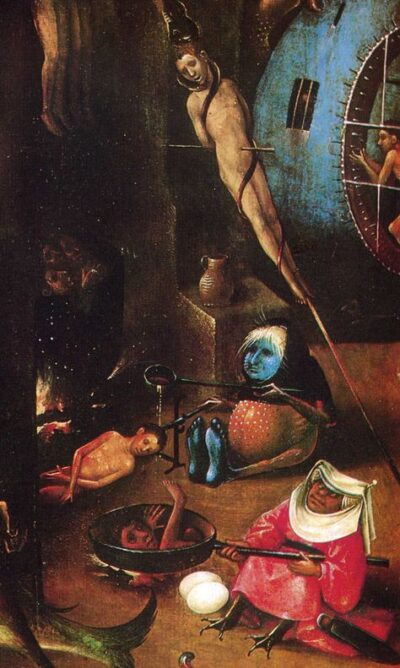
It is this Word which works on us these days, each in their place, each in their cloister, each in their desert, each with a different struggle [fatica]. Places that may be those of a regained intimacy, but which, taken all together, create a single enormous desert that is like a gigantic encounter with reality. Because the desert I am talking about is not the empty streets of the metropolis, which are sad and empty even when they are full and everything flows quickly and makes us sick, but the wild space that exposes us to the Word and within which we fight one by one against temptations. I myself am familiar with many of the temptations I imagine you are fighting these days, for they have also been mine in the past, and partly still are. You know what I mean. One of Jesus’ decisive teachings in the desert, however, maintains that you are not to engage in dialogue with the devil, never, because once you have agreed to do so, no matter how clever you think you are, you remain his prisoner: his speech, his rhetoric, his art of seduction are only so many barriers that close in upon you. How many times have we watched those barriers drive old friends away from us forever?
Day after day, our dwellings are transformed into fragments of a desert wasteland, with its wild animals, its deep, incomparably habitable silence, and its presences, which usually we do not perceive, too overwhelmed by a myriad of other, largely useless things. The challenge is to recognize the right presence, the good one, the one that heals, and to chase away the bad one, the one that makes you sick, that lies to make you lie, that makes you kneel before it in exchange for more power, more things, more worldliness, more recognition, more, more, more... The desert shows us the possible and the impossible.
In fact, the desert was the place reached by the first monachoi, the "solitaries", those who left an unjust, decadent empire. First they left in small numbers, then month after month, year after year, they became hundreds and thousands and thus began to live together, group by group, in cenobia, a word that means nothing other than what we too have always sought: a place of life in common. Even then, as now, the desert was therefore a test that affected both individuals and the community. Communities formed around the cenobies, and finally cities, which received their spiritual strength from the cenobies. From these solitary people who managed to see, from their retreat into the desert, from this community where everything was in common, a new civilization was born. The civilization that later got lost in the centuries because it lost contact with its truth and, with the passage of time, knelt ever more before the demons of capitalism, the same civilization which is now flickering out. The problem is that it wants to take us with it, to its hell.
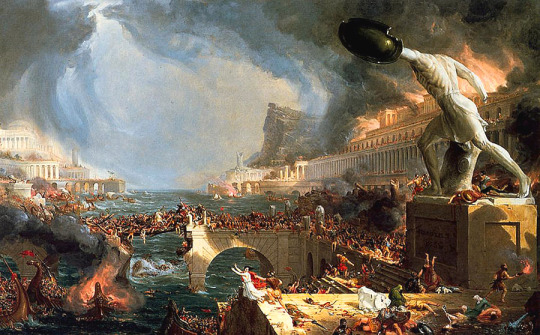
This civilization does not end because of the coronavirus. I think it is clear to everyone that it is only an epiphenomenon. This civilization ends because of its arrogance, its insatiable greed, its injustice, because of its having turned the world into a gigantic morbid factory. What else but a demon of total destruction could have been born from a civilization that erected money as the absolute idol, and power as the ultimate end of all things and all existence?
Once we are out of the "emergency" and out of our desert, for we must always consider dwelling within it as only transitory, we must not allow it to be only a parenthesis, full of suffering and death or even of discoveries and memorable moments, to be followed by a return to the normality of before. For it is precisely this normality that has brought us to the point where we are and which can no longer continue except by deepening the destruction. This normality also includes the normality of our earlier way of life, or rather, our ways of surviving and deluding ourselves. I see that many of us are desperately seeking to reaffirm our own normality. This is not good. In all friendship: it is not worth it.
But we must also pay attention to the normality afterwards, which will be presented to us as the new necessity, made up of prohibitions, lack of freedom and renewed selfishness, all for our own good. Or what improvised prophets will proclaim to be the fabric of the new world, identical to the one before but with different rulers.
We must instead repeat the gesture of separation of the first monachoi: to secede from the decadent civilization of destruction, to build our cenobies, our communes. I have been thinking a lot lately about why we haven’t done it yet, why we haven’t been able to do it, what has prevented us from trying again, and I haven’t been able to give myself any satisfactory answers. Some of you will probably be able to suggest one. I may be starting to glimpse a few that I’ve yet to consider. In any case, I believe this time, in which we have been "pushed" by the Spirit, deserves a true answer. From us. One that could come from the silence we inhabit, the solitude we aim at, the evil we struggle against. What will we do, what will we see, when we leave the desert?
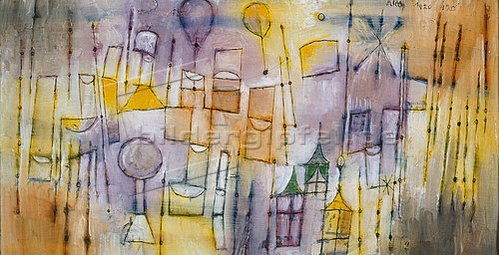
Once out of the desert, the Nazarene announced that the Kingdom was near. I have always interpreted this nearness not in the temporal sense of a not-too-distant future, which no one has ever been able to calculate, but as something we have, or something that is next to us, as is said of a neighbor. Regarding this closeness, I believe we don't need many more words to understand each other.
I send you my love, and I hope to hear from you soon,
Yours,
Marcello
Translated by Keelan O’Sullivan.
78 notes
·
View notes
Text

// He could not bear the force and brightness of her eyes //
Song of Solomon 6V5
“Turn away your eyes from me, for they overwhelm me— Your hair is like a flock of goats leaping down the slopes of Gilead.” (ESV)
“Turn away thine eyes from me, for I can scarce bear the lustre of them. It is a poetical and amatorious expression, signifying how beautiful the church was in Christ’s eyes, and how passionately he loved her.
Thy hair is as a flock of goats that appear from Gilead: this clause, and the whole following verse, are repeated from Song of Solomon 4:1,2. And this repetition is not vain nor absurd, but very agreeable to the nature of a pastoral and song of love, as being an effect and testimony of vehement affection, and besides it confirms what was said before, and showeth that the church’s miscarriages, and Christ’s desertion of her upon it, had not made him change his opinion of her, or affection to her.”
//Matthew Poole’s Commentary
“Turn away thine eyes from me,.... Her eyes of faith and love; not through dislike of them, but as ravished with them; his passions were so struck by them, and his heart pierced with them, that he could stand it out no longer against her; see Sol 4:9. Some render the words, "turn about thine eyes over against me" (b); this being the first time of meeting, after her ungrateful treatment of him, she might be filled with shame and confusion for it, and therefore hung down her head, or looked on one side; wherefore he encourages her to look him full in the face, with a holy confidence; for such looks of faith are very agreeable to Christ; see Sol 2:14;
for they have overcome me; that is, her eyes, they had made a conquest of his heart; which does not imply weakness in Christ, but condescending grace, that he should suffer himself, as it were, to be overpowered by the faith and love of his people, who has conquered them and all their enemies. This clause is very differently rendered: by some, "they have strengthened me" (c); his desire towards his church, and the enjoyment of her company: by others, the reverse, "are stronger than me", or "have taken away my strength" (d); so that he was spiritless, and as one dead, or in an ecstasy: by others, "they have made me fly away" (e); that is, out of himself; so that he was not master of himself, could not bear the force and brightness of her eyes: by others, "they have lifted me up" (f); revived, cheered, and comforted him, through sympathy with her, in virtue of their near union: by others, "they have made me proud", or "prouder" (g); see Isaiah 3:5. Christ has a kind of pride as well as pleasure in his church; he is proud of the beauty he has put upon her, of the graces he has wrought in her; and especially of her faith, when in exercise; see Matthew 8:10; and by others, "they have made me fiercer" (h); not with anger and indignation, but with love; there is a force, a fierceness in love, as well as in wrath: "love is strong as death, and jealousy is cruel as the grave", Sol 8:6; it is so in the church, much more in Christ. All which shows the power of faith, to which mighty things are ascribed, Hebrews 11:1; and here the conquest of Christ himself;
thy hair is as a flock of goats that appear from Gilead; from Mount Gilead; see Gill on Sol 4:1.”
//Gill’s Exposition of the Entire Bible
“overcome—literally, "have taken me by storm." - // JFB Commentary
#faith#hope#anxious#jesus#mental health#faith life#he loves you#nashville#help#love#anxiety#devastated#alcohol dependence#detachment#depression#depressed#hope speaks#sad#loner life#lonely#heartbroken#heartbreak#heartache#those eyes#helpless#trauma#damaged emotions#emotional support#emotions
0 notes
Text
THE HEARTBEAT OF EARTH

“The earth is the Lord’s and all it contains, the world, and those who dwell in it”. (Psalm 24:1)

Our Hebrew word this month is “Geulah.” In Hebrew it literally means “redemption.” We are living in a time of redemption for Israel and the whole world, i.e. “the last days”. In Jerusalem, there is a neighborhood where Christian Friends of Israel had their very first offices. It is near the center of Jerusalem and populated by mainly Haredi Jewish families.
Rabbi Stern explains that the word pidyon also refers to redemption on a case-by-case basis (i.e. the redemption of the individual), while geulah refers to mass redemption (i.e. redemption of the public, or nation of Israel at large). It is a time of restitution, reclamation, reparation and retrieval according to the sages.
All around us, all we have to do is take a look at nature and everything our Wonderful Creator God made by His Own Hands. Anyone who cannot see God in nature, in the way it was so beautifully designed, is sightless and very deceived. To even “think” that this world might have been created by a “big bang” is not even intelligent.

I came across a very informative, and inspirational article from a science related magazine Discover, by Anna Funk. The headlines say: “The Earth Is Pulsating Every 26 seconds, and Seismologists Don’t Agree Why.” Just like clockwork, seismometers across multiple continents have detected a mysterious “pulse” since the early 1960s. Every 26 seconds a little “blip” is seen on their detectors. No one can agree what it is; however, the researcher, Jack Oliver, working at the Lamont-Doherty Geological Observatory on tectonic plates, did not have the digital seismometers that we have today. Then one day in 2005, another graduate student was working on seismic data at his lab at the University of Colorado, and discovered the sound was located in the Gulf of Guinea, off the western coast of Africa. Still no real answers. Fast forward another six years, when another graduate student, Dou Wiens, in a lab at Washington University narrowed down the source of the pulse even more, to the Gulf of Guinea called the Bight of Bonny. According to Discover magazine, it still remains a mystery. It was at the same time I saw this article that I found another article from Rabbi Lazer Brody, and American-Born Hasidic rabbi who teaches on his Lazer Beams blog about the 26-second pulse of earth. It inspires him. “There are so many secrets, places where we can discover HaShem (God, literally the name)” Brody told Israel 365 News. “I focus on simple faith, and science is just a different part of that.” His sentiments are echoed by other rabbis. “It is very consoling,” Rabbi Shlomo Katz of Efrat, Israel, said “...in these last stages before the geulah (final redemption), it is clearly important to be in tune, even literally, with the planet...to see how the entire world fits into God’s plan...the 26-second duration of the microseismic pulse is explained by the gematria (Hebrew Numberology) of God’s name (Y-H-V-H), spelled out by the Hebrew letters equals 26… In English, the name of God has been transliterated as YHVH, with the meaning often rendered as “I AM” which carries the value of 26 also. God could have made the world in an infinite number of ways but here we see that every detail is for His glory”, he added. Rabbi Shaul Judelman, former director of the Ecology Beit Midrash, says the Bible itself actually refers to what he called, “the earth dancing for the Name.” How wonderful to think that “maybe” this is a heartbeat of earth dancing for Him. It is something to think about. True treasures are found in the Words of the Everliving God. They never grow old. We only need to search for them. As the scientists continue to search for the “blip” that sounds like a heartbeat for earth, let us also search for God in new ways of being with Him, concentrating on Him, and the width, breadth and height of His Great Love for His World and for all of us. May “Geulah” come soon and may the King of all Kings come to usher it in. We wait for Him.
Let Us Enter the Throne Room of His Grace
The Duty of a Watchman is to stand on the wall of prayer and look for approaching dangers and (for us) to pray.
Intercede that hearts everywhere, especially in Israel, will become humble before a Mighty God, for God’s Hand is outstretched at all times for all who come to Him in honest prayer. “The leaders of Israel and the king humbled themselves and said, “The LORD is just” (2 Chronicles 12:6).
Thank God that the Israeli IDF has recently discovered a very large underground tunnel – one of the largest ever found which would have perhaps caused many casualties. Thank God that the Bible says that “Nothing in all creation is hidden from God’s sight” (Hebrews 4:13). We thank Him who led the soldiers to discover this hideout and that it was laid bare for all to see and prevented many deaths of innocent people in Israel.
Fervently pray for a unity government in Israel as Israeli possible elections come to pass. May the leaders of Israel seek God for the leader God has prepared for the people at this time. “Is it a fast like this which I choose, a day for a man to humble himself?” (Isaiah 58:5).
Praise His Name that Israel will be protected by the Almighty as He is Our Defender. “Yes, your protection comes from the LORD, and he, the Holy One of Israel, has given us our king” (Psalm 89:18).
Beseech His Face for Israel’s Prime Minister as he is under much pressure and attacks even upon his life. “Whoever is pregnant with evil conceives trouble and gives birth to disillusionment” (Psalm 7:14). “He who dwells in the shelter of the Most High will abide in the shadow of the Almighty” (Psalm 91:1).
Pray for a Godly leader in Israel to arise, one that has the fear of the Lord in his heart. Naftali Bennett and Yossi Cohen are candidates for the Prime Minister’s successor. It is an historic time for the people of Israel as they experience a common crisis with the rest of the world. They are working with their brothers in the Diaspora and praying that they will support one another through many personal difficulties. As one solidarity campaign put it: “Make us look up and look each other in the eyes. Only this way can we get out of this crisis in peace and even become stronger” (Naftalie Bennett). “A Song of degrees. I will lift up mine eyes unto the hills, from whence cometh my help” (Psalm 121:1).
Read Together and Proclaim that Israel leaders and religious leaders will begin to rely only on the Lord and not on other nations. “And the Israelites were subdued on that occasion, and the people of Judah were victorious because they relied on the LORD, the God of their ancestors”
(2 Chronicles 13:18).
Whatever God has in store for the world in the coming days, let us bind together in faith and unity on doing what HE says to do, and not man. May we walk in the fear of the Lord and continue to love the Nation of Israel and her people and to proclaim all the promises God has for her and for those who stand with her. God bless you all and thank you for your prayers for Israel, for the ministry of Christian Friends of Israel around the world and for us personally. You are of great importance to us.
In His Service Together,
Sharon Sanders
Christian Friends of Israel - Jerusalem
0 notes
Text
Ordinarily I’d wait until I've finished a book to start blogging about it, but I’m only about 100 pages into Ada or Ardor, there’s already so much to say, and I don’t anticipate it being a short read.
I have a complicated relationship with Nabokov. I appreciate Pale Fire or Lolita as literature, they appeal to most of my aesthetic sensibilities, I’m very glad I read them, I plan to do it again, and I found them both, from start to finish, really viscerally unpleasant. Ada or Ardor isn’t like that. It’s unpleasant in places, but not claustrophobic the way his other novels sometimes are. There’s such a profound sense of world. Not that I’m entirely clear on how much of that world is actually in Van’s head or really what the fuck is even happening.
I’d say it’s the postmodern 19th-century SFF novel I didn’t know I wanted, but that’s a genre preference I was honestly pretty well aware of. I’m sure that when more things start to happen I will have more opinions on how they relate to science fiction genre theory.
Until the plot starts to materialize, I’m just in it for the language. When I’m reading German or Hebrew or Latin, the sound and texture and rhythm of the words have a stronger aesthetic effect than what it is they mean. It’s a property of not being fluent, and Nabokov is one of a very few authors who can do that to me in English. It’s strange to read about his regrets over having to write in English instead of Russian - I’m not sure a native speaker could have written this book. (I’m not sure how anyone could have written this book).
It’s something I’m struggling to articulate. Nabokov isn’t trying to communicate any kind of sensory experience, words matter in that they are words, not in that they point to things. The content is still there, but it’s connected to the text at a remove; everything is lighter, looser, more playful. It’s not that he’s not a very visual author, but he’s translating, not transcribing, real things (”real things”?) are represented as the auditory effect of all that accumulated specificity. The only passage I’ve both underlined and highlighted:
Natural history indeed! Unnatural history - because that precision of senses and sense must seem unpleasantly peculiar to peasants, and because the detail is all: The song of a Tuscan Firecrest or a Sitka Kinglet in a cemetery cypress; a minty whiff of Summer Savory or Yerba Buena on a coastal slope; the dancing flitter of a Holly Blue or an Echo Azure - combined with other birds, flowers, and butterflies: that has to be heard, smelled, and seen through the transparency of death and ardent beauty. And most difficult: beauty itself as perceived through the there and then. The males of the firefly (but now it’s really your turn, Van).
That’s all, the rest is commentary.
29 notes
·
View notes
Text
D-Views OFF TOPIC!: The Prince of Egypt
Hello, everyone! Welcome to another installment of D-Views Off-Topic! As stated previously, D-Views is a series primarily focusing on Disney-produced and/or owned films, but from time to time, we go “off topic” to discuss films that are sometimes mistaken for and/or were influenced by Disney projects, and that’s what we’re doing today.
I am super excited about today’s subject – it has been one of my favorite films since I was a child, and it is, in my opinion, the single best non-Disney-produced animated film ever made. This is The Prince of Egypt!
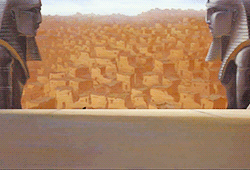
Before we talk about The Prince of Egypt, it is imperative to talk about the studio that created it, DreamWorks SKG. (As a side, get used to me calling it just “Dreamworks” from here on out – I’ve never been much one to capitalize the “W.”) Dreamworks was the baby of three media giants – David Geffen, Stephen Spielberg, and most of all Jeffrey Katzenberg. Katzenberg got his start in the world of animation at the Walt Disney Company during the Disney Renaissance, when he was head of the Disney animation department. Unfortunately Katzenberg was just one of three very big egos at the company in that period, and he butted heads with the other two – CEO Michael Eisner and vice-chairman Roy E. Disney – constantly. For a while Frank Wells, Eisner’s partner, was able to keep the peace and keep these three working toward the same goal, but when Wells tragically passed away in a helicopter crash in 1994, tensions began to rise. Disney and especially Eisner thought that Katzenberg had been promoting himself as the main face of Disney’s new-found success and taking all the credit for it, and so when Wells was to be replaced, Eisner pointedly passed Katzenberg over for promotion. Whatever one thinks about Eisner or Katzenberg as people, I think it is very clear that Eisner felt threatened by Katzenberg…and he had good reason, because when Katzenberg was forced to quit his position at Disney, he immediately turned around and enlisted the support of Stephen Spielberg and David Geffen to create Disney’s main rival in the world of animation in recent history.
Dreamworks Animation found most of its animators among Disney alumni and from Stephen Spielberg’s dead studio Amblimation, which had previously only worked on three films: An American Tail: Fievel Goes West, We’re Back!: A Dinosaur’s Story, and Balto. Despite their lack of experience, they were very talented, as is evident by Dreamworks’ first hand-drawn film. Yep – first hand-drawn film. Dreamworks released two films in 1998; their real first film, Antz, was released in theaters three months before The Prince of Egypt was. To be frank, I wish that The Prince of Egypt had been first – it would’ve made a much stronger first impression for the studio as a whole.
Fortunately The Prince of Egypt made a pretty good impression when it was released to theaters in December 1998. It earned over $218 million worldwide and received rather favorable reviews from critics for its animation and visual effects. It also won an Academy Award for Best Song and was nominated for two Golden Globes, two Grammy Awards, and five Annie Awards, and even tied with Pixar’s rival film to Antz, A Bug’s Life, at the Critics’ Choice Awards for Best Animated Film. Even at the time of its release, however, The Prince of Egypt was compared to Disney’s animated projects. Critic James Berardinelli said this –
“Like Fox (with Anastasia) and Warner Brothers (with the disappointing (sic) Quest for Camelot), Dreamworks intends to challenge Disney's reign as the King of Animation. The Prince of Egypt is a worthy starting point. It ranks alongside the Magic Kingdom's Mulan at the top of the year's traditional-style animated pile. (…)While last year's Anastasia managed to come close to Disney's visual elegance, The Prince of Egypt matches it. This impressive achievement uncovers yet another chink in Disney's once-impregnable animation armor.”
Now that I have effectively “prologued” you to death, let’s go ahead and talk about the film proper.

The very first thing we have to talk about when it comes to this movie is its music, written by film-scoring giant Hans Zimmer and lyrical god Stephen Schwartz. Just like in Beauty and the Beast and Anastasia, this soundtrack in my opinion is just flawless. Every single song hits your heart and stays with you long after they have passed, from the lyrical musical numbers to the instrumental tracks. The first one, “Deliver Us,” introduces us to the setting of the mature, real, passionate, epic story that is about to unravel. We hear the culture in the rhythms and instruments used and in the Hebrew lyrics sung by Ofra Haza, who plays Moses’s mother Yoheved. We feel the hopelessness of the slaves and the fragile hope of a young girl as she sees her baby brother being taken in by the Queen of Egypt. We watch this opening scene with almost no dialogue, being told solely with the images on screen and the wonderful music, and become completely emotionally invested in these characters by the end. With this opening, the film has already done what the best musicals do – introduce our story, conflict, and characters solely through song. And from here, the music only gets better.
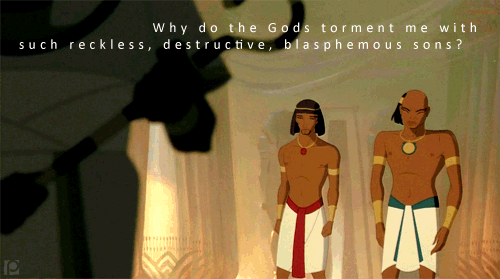
After this prologue, we meet our main character again, as well as his adopted brother, the crown prince Rameses. Moses and Rameses are shown, in their youth, to be like two troublemaking college kids, constantly competing with one another and having no awareness of grim reality. They are two princes, born in wealth and affluence, and as of yet do not see their privilege. Once their fun is through, however, we are introduced to their father, Pharaoh Seti. In his first scene, we see Seti as a strict man, focused on his legacy and greatly disappointed in his sons’ misadventures, particularly on Rameses’s part. At this point, we can still understand where Seti is coming from – after all, Rameses and Moses did cause some damage and they should be setting a better example as princes – but that doesn’t make watching Seti viciously snap at Rameses and Rameses struggling to hold in his hurt any easier.
Like Anastasia as well, this film has an all-star cast. Val Kilmer, Ralph Fiennes, Michelle Pfieffer, Sandra Bullock, Jeff Goldblum, Patrick Stewart, Steve Martin, Martin Short…although I could argue in some future projects, Dreamworks focused too much on casting big names in a lazy attempt to get more butts in the theater seats (looking at you, Shark Tale), I think in this case, every casting choice made was pretty spot-on. My personal favorite casting is Fiennes as Rameses – Rameses as a character is much more complex than most “antagonists” in other mainstream family films, and I think it would’ve been hard to find someone better than Fiennes to portray that.
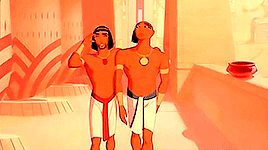
Rameses and Moses is my single favorite relationship in this movie, and it makes sense – it is clearly the one the filmmakers put the most focus and effort into. Rameses can be a serious, proud, ambitious cynic, while Moses can be a light-hearted, sympathetic, mischievous peacemaker. Basically it’s a bond between a Slytherin and a Hufflepuff – darkness and light – and the relationship between these two brothers is so well written that it alludes to years of history that justifies the strength of their trust. It’s why Moses tries to make peace between Rameses and Seti once Rameses storms out of the room. It’s why Moses tries so hard to cheer Rameses up afterwards. It’s why Rameses, upon being formally named Prince Regent, names Moses his Royal Chief Architect.
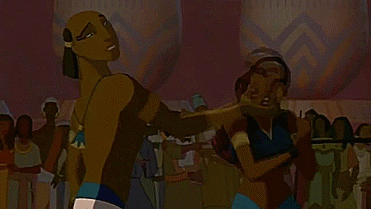
Speaking of which, at the party where Rameses is given that title, we meet the character of Tzipporah, who is given to Rameses as a gift, but who Rameses “re-gifts” to Moses. In this sequence, we see another hint of Moses’s compassion. When the guards try to capture Tzipporah, swords drawn, Moses immediately intercedes and tries to restrain her himself, so that she wouldn’t be hurt or killed by the guards. Admittedly he mischievously lets her fall into a fountain, but it is still an infinitely kinder way to halt her escape than the alternative would’ve been. Nonetheless, we see Moses regretting his action when he sees his mother’s disappointment and Tzipporah’s wrath. Later Tzipporah escapes from the palace, and Moses pursues her. When Moses spots that some guards are about to catch her escaping, however, he once again intercedes. This time he actually misdirects them, sending them up to his chambers and away from Tzipporah, who had been directly behind them. It gives a subtle hint that Moses, even before learning the truth of his heritage, does have something in him that sees the value of freedom. Moses then follows Tzipporah all the way to the border of Egypt, until she escapes off into the desert. It is here that Moses meets Miriam and Aaron – his real siblings.

GOOD GOD THIS SCENE. ALL OF THE FEELS FOR THIS SCENE. I swear, I can’t help but feel so much for Miriam here. The hope in her voice is just heartbreaking when Aaron tries so hard to shut her down and Moses retorts in ignorant outrage. Then Miriam starts singing her mother’s old lullaby, and everything just…stops. The music dies utterly, and the only thing hanging in the air is Miriam’s choked voice. (Fun bit of trivia: one of the film’s directors, Brenda Chapman, provided Miriam’s voice in this scene. You may also know Brenda Chapman as the brain behind Disney/Pixar’s film Brave.)
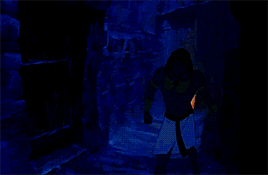
Miriam’s hushed reprise then dissolves into quiet, horrified orchestration that then slowly builds, until it stumbles back and charges into a run just as Moses does. This orchestration then leads us into my favorite song in the entire film, “All I Ever Wanted.” From the time I was young, this song could always get my heart pounding. I felt all of the fear, all of the longing, all of the denial, all of the pride, and all of the doubt that rippled through Moses’s voice and over his face. When I was in high school and I would listen to this in my headphones on my way to school, I would run down the streets just like Moses did in the film, plodding through all the emotions expressed in each note. Even now I think it is one of the most unique songs sung by a protagonist in a musical that I’ve ever heard. Most “I Want” songs are about wanting more, but this song is about wanting things to stay the same. Rather than seeking adventure, Moses seeks peace and happiness – to stay in this dream world that he’s only just seeing was just a dream. It reminds me of how I felt when the September 11th terrorist attacks happened. When you first see the fragments of your old life shattered around you, you first feel this instinct to grab them and try hopelessly to glue them back together. As time goes by, though, you see how painful such an effort is – it’s like even just clutching those broken shards of your childhood is making your hands bleed – and so you have no choice but to let go of them.

“All I Ever Wanted” dissolves into Moses’s dream sequence, which is entirely drawn in a hieroglyphic-inspired style. This is such a creative sequence – it’s so stylistic, and yet it doesn’t forget to make the stilted movements translate the proper emotions. When Moses wakes up from the nightmare, he also wakes up from his delusion, and decides he must learn the truth. This revelation scene is my favorite part of the entire film. Moses runs down the halls of hieroglyphics, combing wall after wall, until he finally finds what he’s looking for. He sees the image of his father, Seti, ordering his guards to throw babies into the Nile River. The young prince is horrified, heartbroken, at what he sees…and Seti brings a hand down on top of his head, trying to show him some comfort. Moses turns to look at him, pleading with him, “Father, tell me you didn’t do this,” but Seti cannot give Moses that “out.” Instead the old Pharaoh justifies the decision, and even worse, tries to excuse it. “They were only slaves.” Seti’s evil face is truly revealed – the face of callous, wicked ignorance, garbing itself in gold and silk. For more of my thoughts on this scene, you may read this post of mine analyzing it, but to sum it up here, this is the scene that taught me as a kid that evil is not always self-aware…and it even now chills me, just as much as it does Moses. That horrible shrieking of the strings that accompanies Moses’s facial shift from sorrow to horror as he slowly removes himself from Seti’s arms and backs away is a musical representation of everything I feel watching this scene.
After being counseled by his adopted mother Tuya, Moses tries simply to be happy with his fortunate circumstances, but now that he knows the truth of his birth, he can no longer not see the injustices and cruelty around him. He can’t block out the image of his people being worked within an inch of their lives. He can’t block out the furious shouts of an overseer and the horrible, pained cries of an elderly slave being whipped. And it is in this sequence that we get one of the best instrumental tracks in the entire film. The track is called “Goodbye Brother,” and it accompanies Moses accidentally killing an overseer to protect a slave and running away from home. I’ve also discussed this track (and a few others from this film) in another post, but like with Seti, I will restate my core points here. The best piece of this track is the middle, which happens just before Moses kills the overseer. It is a horrific, demented shrieking, one that sounds like what nails being driven into your brain should feel like. The sound is like the accompaniment of a nightmare that you can’t escape. And then just as suddenly, the nightmarish feeling is gone…to be replaced with a different kind of fear and horror, the kind that you feel when you realize it’s not just a horrible dream, the kind that gives way to panic. Moses running away is echoed in the music with every racing, plodding note, until it, like Moses, is brought to a rough halt. From here, a great sorrowful sound takes over – as if the music is mourning what could’ve been just as much as Moses is. Partner this with the tragic verbal exchange between Rameses and Moses, and I think just about everyone’s heart will break by the end of the scene.

So from here, Moses flees into the desert, shedding his identity as a Prince of Egypt, and joining Tzipporah’s tribe of Midianites. While there, we get another amazing song (“Through Heaven’s Eyes”) and see Moses grow from a boy into a man. Even though Moses has grown so much, however, there is still business for him to take care of, and that business becomes clear when he follows a lost sheep into a cave and finds a Bush alight with white, inhuman fire. The instrumental for this sequence, “The Burning Bush,” is in my opinion not only the best instrumental in the film, but also the best non-Disney instrumental I have ever heard. I have never been a particularly religious person – Hell, my parents are a non-practicing Christian and an Atheist. But whenever I encounter a particularly wonderful piece of art, landscape, or music, I think I feel what some people call spirituality. It is a sensation that makes you feel lighter and warmer, like a balloon slowly filling up with air, devoid of fear, worry, and pain. It is a dreamy feeling that makes you feel one with everything, and everything feel like it is as it should be…and once you know that feeling, you can’t imagine losing it. This track is a perfect representation of those feelings – it is enlightenment, in musical form, from its raindrop-like pattering to its slowly rotating tone like a globe spinning on its axel.

Something else interesting about this sequence is how God is depicted. Unlike in The Ten Commandments, which The Prince of Egypt is based upon, this God is depicted more like the New Testament God, being much kinder and gentler than the vengeful God that is more often found in the Old Testament. On top of this, this God is actually voiced by Val Kilmer, who also voiced Moses, making it so Val Kilmer is technically talking to himself in this scene. There are two ways I could read this – one, it speaks of how God is representative of Moses’s inner-voice, so this scene is a metaphor for Moses coming to grips with his own morality; or two, Moses is seeing himself in God, because Man was made in God’s image, and so by the end understands that he has God’s power inside of himself. Either way, Moses realizes that he can’t run away from his responsibility to his people and goes back to Egypt to confront the Pharaoh.

Alas, when Moses arrives, he does not confront Seti, but his brother Rameses. I cannot lie, Rameses and Moses reuniting is a scene that always makes me smile, even if my heart’s breaking at the same time. GODDAMN IT, MOVIE, HOW DARE YOU DO THIS TO ME. After the “Playing with the Big Boys” song number by Hotep and Huy (which I suppose is the weakest of the songs, but is still pretty damn good), Rameses and Moses talk the matter over. Moses tries to explain his position to Rameses, and it is here that Rameses too finds his rose-colored glasses cracking. His idealistic hope that his brother was back and they could live as they had is flickering and dying. There is no going back for Moses. He is choosing the well being of Hebrew slaves over the brother he grew up with. And this betrayal hurts Rameses deeply. The animation on Rameses’s face in this scene – from heartbreak, to anger, to shock, to regret, to grief, to vengeance – is perfectly paced and spot-on. From this scene on, Rameses has officially become the anti-villain of the film – the reluctant rival to our reluctant hero.
On the face of things, Moses has made everything worse with his return. Rameses has turned against him and the slaves bitterly scorn him for his battle against Pharaoh. But one slave is with him from the start – his sister Miriam. She rallies the slaves behind Moses, and Moses stands with new strength. He commands Rameses again to “let his people go,” again, again, again, with multiple plagues, to the accompaniment of “The Plagues.” My favorite part in this song is the inner-monologues from our hero and our anti-villain that unconsciously mirror each other.
Once I called you brother; // You who I called brother,
Once I thought the chance to make you laugh // How could you have come to hate me so?
Was all I ever wanted… // Is this what you wanted?
And of course the ending –
I will not LET your/my PEOPLE…GO!
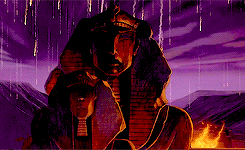
The Plagues play out one by one, before we reach the Plague of Darkness. Moses goes to find Rameses and tries one last time to convince him to relent before the next Plague arrives. I’ve talked about this scene and Rameses’s son in the past, and you can read that here, but I will just add that I love the parallels this scene makes to earlier scenes of Moses in the palace. Not only do some shots parallel the scene of Moses comforting Rameses at the beginning of the movie, but Moses also passes the pillar and statues that he runs to in the “All I Ever Wanted” sequence. It’s such a bittersweet juxtaposition.
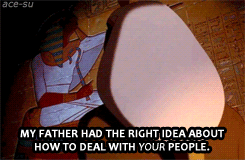
Sadly Moses and Rameses cannot go back to the way things were, however much they wish it. The destinies that have been written for them and the responsibilities therein make it impossible…and this scene proves this once and for all. Rameses, refusing to drop his pride and refusing to bow to the pressure of someone who threatens the security of his empire, crosses the line and threatens the murder of Moses’s people. Moses cannot save him or Egypt from the final Plague now…and so the First Born are slain, with an inhuman light that literally breathes His victims’ last breath.
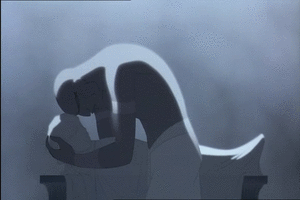
The scene centering on the Death of the First Born is a very powerful one. A striking choice is having it mostly done in silence, with no instrumental music at all. The only sounds other than the Angel’s breathing are the blowing wind, some rattling of trees and roofs, crickets chirping, and finally the howls of despair from all of the parents upon discovering their dead children. The scene hits home when we see Rameses holding his dead son in his arms – Moses comes up behind him out of the white light beyond, and for a moment, he is the Angel of Death himself, bearing witness to the grief of the Pharaoh that was once his brother. And as much as I disapprove of Rameses’ sentiments in the last scene and agree that Moses’s people should be freed…I do not blame Rameses in the least for his inconsolable, furious withdrawal from Moses’s comforting hand. I don’t think I could forgive anyone who took someone I love from me…no matter how noble the person’s cause. This still does not make me feel any less for Moses when he walks off by himself, drops his staff, and then slowly falls to his knees, collapsing in on himself as he tries in vain to suppress his sobs.
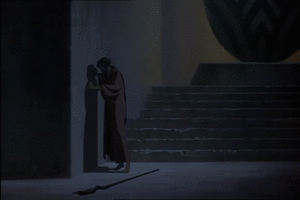
At long last, the Hebrews have their freedom, and with it, we get our final lyrical number – the Academy-Award-winning song “When You Believe.” This song is a good example of how, even though this film can get so serious, those darker elements are mitigated perfectly with a lot of sincerity and heart. This song is like a beautiful sunrise after a night of thunderstorms. The mist is still clinging to the air and remnants of the rain are still falling from the shingles of roofs, but sunlight is bouncing off the droplets, sparkling like tiny diamonds, and the clouds are touched with pink. Then the children start their verses in Hebrew, and a new, youthful life is infused into the piece, ringing with the hopes and dreams of a new beginning. Where something has ended, something has now begun, and after the darkest of nights, the sun has returned.

Just when it seems the Hebrews have succeeded, Rameses does try one last time to circumvent them, by charging after them with his army. Moses parts the Red Sea, the Hebrews make it across, and the Sea comes back together just as Rameses and his army are charging through it. It is only after this that we come full circle – the music at last returns to the theme from the very beginning, “Deliver Us.” Moses has answered that prayer. He has delivered his people to freedom. And so as Moses comes down Mount Sinai with the Ten Commandments in hand, I frankly don’t care about what happens next in the actual Biblical story – the ending is more than enough to fulfill me.
The Prince of Egypt is very special to me. As you can tell from all of the links in this post, it is a movie I love talking about and I think I will never stop talking about. It saddens me that this film is not more recognized by the world at large, like so many other great animated films are. Its soundtrack is in my opinion one of the best animated musical soundtracks ever recorded. Its animation is stunning, evocative, and detailed. Its characters are multi-faceted and real. Its story is epic, timeless, and emotional. Recently there was an attempt to bring it to Broadway, but that attempt was scrapped because of the backlash in response to its all-white cast (gee, I can’t imagine why *oh hai there sarcasm*). I sincerely hope that the project will be attempted again, however – maybe The Prince of Egypt can be brought back to the public consciousness again by going to the Broadway stage, as Anastasia has. In the meantime, though, we do have the original masterpiece, and I will always view it as the best film ever produced by Dreamworks.
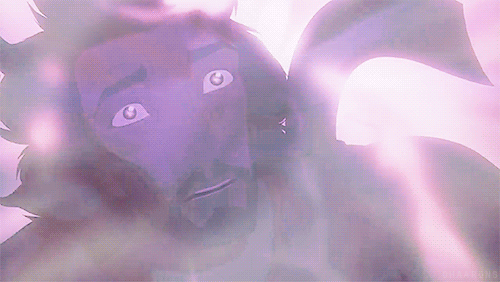
117 notes
·
View notes
Text
My Sunday Daily Blessings
October 20, 2019
Be still quiet your heart and mind, the LORD is here, loving you talking to you...........
Twenty-ninth Sunday in Ordinary Time
Lectionary: 147
First Reading: Exodus 17: 8-13
In those days, Amalek came and waged war against Israel. Moses, therefore, said to Joshua, "Pick out certain men, and tomorrow go out and engage Amalek in battle. I will be standing on top of the hill with the staff of God in my hand." So Joshua did as Moses told him: he engaged Amalek in battle after Moses had climbed to the top of the hill with Aaron and Hur. As long as Moses kept his hands raised up, Israel had the better of the fight, but when he let his hands rest, Amalek had the better of the fight. Moses'hands, however, grew tired; so they put a rock in place for him to sit on. Meanwhile Aaron and Hur supported his hands, one on one side and one on the other, so that his hands remained steady till sunset. And Joshua mowed down Amalek and his people with the edge of the sword.
Responsorial Psalm: Psalm 121: 1-2, 3-4, 5-6, 7-8
"Our help is from the LORD, who made heaven and earth."
Second Reading: 2 Timothy 3: 14-4:2
Beloved:
Remain faithful to what you have learned and believed, because you know from whom you learned it, and that from infancy you have known the sacred Scriptures, which are capable of giving you wisdom for salvation through faith in Christ Jesus. All Scripture is inspired by God
and is useful for teaching, for refutation, for correction, and for training in righteousness, so that one who belongs to God may be competent, equipped for every good work.
I charge you in the presence of God and of Christ Jesus, who will judge the living and the dead, and by his appearing and his kingly power: proclaim the word; be persistent whether it is convenient or inconvenient;
convince, reprimand, encourage through all patience and teaching.
Verse before the Gospel: Hebrews 4: 12
Alleluia, Alleluia.
"The word of God is living and effective, discerning reflections and thoughts of the heart."
Alleluia, Alleluia.
Gospel: Luke 18: 1-8
Jesus told his disciples a parable about the necessity for them to pray always without becoming weary. He said, "There was a judge in a certain town who neither feared God nor respected any human being. And a widow in that town used to come to him and say, 'Render a just decision for me against my adversary.'For a long time the judge was unwilling, but eventually he thought, 'While it is true that I neither fear God nor respect any human being, because this widow keeps bothering me I shall deliver a just decision for her lest she finally come and strike me.'" The Lord said, "Pay attention to what the dishonest judge says. Will not God then secure the rights of his chosen ones who call out to him day and night? Will he be slow to answer them? I tell you, he will see to it that justice is done for them speedily. But when the Son of Man comes, will he find faith on earth?"
**Meditation:
What can a shameless and unjust judge pitted against a crusty and pestering woman teach us about justice and vindication (to restore what is right and just) in the kingdom of God? Jesus tells a story that is all too true - a defenseless widow is taken advantaged of and refused her rights. Through sheer persistence she wears down an unscrupulous judge until he gives her justice. Persistence pays off, and that's especially true for those who trust in God. Jesus illustrates how God as our Judge and Vindicator is much quicker to come to our defense and to bring us his justice, blessing, and help when we need it. But we can easily lose heart and forget to ask our heavenly Father for his grace and help.
Faith-filled persistence reaps the fruit of justice and grace
Jesus told the parable of the persistent widow and the unjust judge (Luke 18:1-8) to give his disciples fresh hope and confidence in God's unfailing care and favor towards us (grace). In this present life we can expect trials and adversity, but we are not without hope in God. The Day of the Last Judgment will reveal that God's justice triumphs over all the injustices perpetrated by a fallen world of sinful people and that God's love is stronger than death (Song of Songs 8:6). Those who put their faith in God and entrust their lives to him can look forward with hope and confident assurance. They will receive their reward - if not fully in this present life then surely and completely in the age to come in God's kingdom of righteousness, peace, and joy (Romans 14:17).
Jesus ends his parable with a probing question for us. Will you and I have faith - the kind of faith that doesn't give up or lose hope in God - but perseveres to the end of our lives - and to the end of this present age when the Lord Jesus will return in glory as Ruler and Judge of All? Faith is an entirely free gift that God makes to us. We could not believe, trust, and persevere with hope if God did not first draw us to himself and reveal to us his merciful love and care. If we want to grow and persevere in faith until the end of our days, then we must nourish our faith with the word of God and ask the Lord to increase it (Luke 17:5). When trials and setbacks disappoint you, where do you place your hope and confidence? Do you pray with expectant faith and confident hope in God's merciful care and provision for you?
Sources:
Lectionary for Mass for Use in the Dioceses of the United States, second typical edition, Copyright © 2001, 1998, 1997, 1986, 1970 Confraternity of Christian Doctrine; Psalm refrain © 1968, 1981, 1997, International Committee on English in the Liturgy, Inc. All rights reserved. Neither this work nor any part of it may be reproduced, distributed, performed or displayed in any medium, including electronic or digital, without permission in writing from the copyright owner.
**Meditations may be freely reprinted for non-commercial use. Cite copyright & source: www.dailyscripture.net author Don Schwager © 2015 Servants of the Word
0 notes
Text
Intent & Purpose Revealed! part 2
Jehovah-Shalom (Sha-lom')The Lord is peace - Judges 6:24 The true meaning of this name reveals much more to us than what we've normally understood peace to mean. The word "Shalom" is a rich word that literally means: health, prosperity, happiness, favor, safety and peace. This word speaks of our wholeness and harmony with God, and our contentment and satisfaction in this life. In brief, it simply means,nothing missing and nothing broken!
Nehemiah 8:10 says: "The joy of the Lord is our strength," a true blessing and result of peace. Jesus spoke of this joy in John 15:11, making clear His intent when He said: "These things I have spoken to you that My joy remain in you and that your joy may be full." Through the work of the cross, we have the right to be free from all anxiety. Isaiah 26:3 reads: "You will keep him in perfect peace, Whose mind is stayed on You, Because he trusts in You." What a blessing. Just receive it - don't struggle for it - it's who He is.
In Isaiah 9:6-7 it calls Jesus the Prince of Peace, the Prince of Shalom - the Prince of healing, prosperity, happiness, favor, and safety. Then it goes on to say: "Of the increase of His government and peace there will be no end." Think of it, Jehovah-Shalom is saying, "It's yours and there is no end to it, both in quantity and longevity - it's all yours. From this time on and forevermore, put your faith and trust in Jehovah-Shalom.
Release it on your spouse, your marriage, your family, and over all that concerns you. It's yours!!! Through the redemptive work on the Cross the sin barrier has been broken and we can now come "Boldly" to the Throne of Grace and obtain mercy and find grace to help in time of need! - Hebrews 4:16.
Because I have accepted Jesus into my heart: I have the right to health, prosperity, happiness, favor, safety, and peace. Because of the shed Blood of Jesus, I have the right to Joy, full joy because you are my peace. Because of that Peace I have the right to come "Boldly" (with confidence) to the Throne of Grace whenever I want. I am free from anxiety, it has no right to have a hold on me, because Jesus set me free! Praise Him and receive Him as your Peace today!
Jehovah-Rapha (Rah'-phah)The Lord Heals - Exodus 15:26 This name is what our web site is all about, revealing the Lord as our complete healer. The word "Rapha" literally means: cause to cure, to make whole, to heal, to mend or repair, a physician. Many have stated that Isaiah 53:5 is only speaking of a spiritual healing. However, we see that Matthew 8:16 - 17 does not agree with that assessment, and Matthew himself alludes to Isaiah 53, stating that physical healing was the fulfillment of that scripture. Understand that Healing is for the entire man - spirit, soul and body, 1 Thessalonians 5:23 confirms this fact stating that we are to be preserved blameless - without or being free from condemnation, the entire man.
Probably the boldest proof of this is found in Galatians 3:13, that states we've been redeemed from the "curse of the Law." The curse of the Law is found in Deuteronomy 28:15- 68 and I suggest that you read it and see what you've been redeemed from. Especially read verse 61 that tells us the curse of the Law is inclusive of every sickness and disease that could ever be! Galatians 3:13 states boldly then that we've been redeemed from it all!
According to these scriptures, you must come to understand and believe that sickness and disease are illegal to the believer. You need to know this - I can not stress this enough! We have the right to walk in Divine health! Remember, Jesus Christ went to the cross spirit, soul & body to redeem us spirit, soul & body. It is a finished work- 1 Peter 2:24, By His stripes you were healed!!! (past tense - it's already done!)
Because I have accepted Jesus into my heart: Jesus You are my healer and my right to Divine Health. I am redeemed from the curse of the Law and therefore under the blessing. Sickness and disease have no right to reside in my body. By the stripes of Jesus I was and I am healed! I am blameless - free from condemnation! Praise Him and receive Him as your Healer today!
Jehovah-Nissi (Nis'-see)The Lord my Banner - Exodus 17:15 This name reveals to us the fact that the Lord is our victory and that we should expect it in every situation! In Old Testament times when an army would go out to war, the musicians would be out in front to set the tone for victory, but in front of them would be the banner carriers! Basically stating or proclaiming that their king is stronger and more able to defeat the other king. Isaiah 11:10 is a powerful scripture stating boldly that Jesus is our Banner - our Victory! He is our victorious King through the shed Blood!
Song Of Solomon 2:4 tells us: "His banner over us is Love" and 1 Corinthians 13:8 says "Love never fails." Hallelujah!!! This Banner represents God's cause and is a sign of deliverance and salvation - sure victory (1 Corinthians 15:57) and has made us More Than Conquerors (Romans 8:37)! Are you expecting good things to happen to you? You should, you are highly favored by God and Jehovah-Nissi is your Lord! Shake off that mindset of doom and gloom, you are destined to win!
As you praise Him every day as your victory, you will begin to expect victory instead of lack or defeat. Take a look at Psalm 5:12 this victory from the Lord has drenched you with His favor: "For you O Lord will bless the righteous, with favor you will surround him as with a shield!"
Because I have accepted Jesus into my heart: I receive you as my banner and that banner over me is Love and it (You) never fails. Through Jesus, You have made me more than a conqueror! Since you are for me, then WHO can be against me? No matter how big the storm or how much the winds blow, Lord You are my victory and I will come through it! I cannot lose, I am surrounded with FAVOR, and therefore victory. Praise Him and receive Him as your Victory today!
Jehovah-Jireh (Ji'-rah)The Lord's Provision shall be seen - Genesis 22:14 This name reveals the Lord as our provider in every situation you could ever encounter. An actual translation of this name is - Jehovah will see (to it)!!! I like that! Whatever I have need of He will see to it!!! He is the Lord who sees our needs beforehand and makes provision for them. Isaiah 46:10 tells us that He declares the end from the beginning - He has already declared your supply and provision from before the foundations of the Earth were ever formed!
Often the enemy tells us we are going to fail because of a lack of provision. It's comforting to know that Jesus took the curse of failure and became for us the source of our success and through the Lord Jesus Christ we can do all things (Philippians 4:13). This name speaks not only of His ability to provide for us, but of His willingness to do so. Take a look at the provision of blessing He has provided for us in Deuteronomy 28: 1-14. I get excited every time I read them and you should too. That's your inheritance - Believe it, Receive it and act upon it!
If you would do a word study on the word "blessed," you would find it can be summed up as "empowered to succeed."Philippians 4:19 beautifully reads: "And my God shall supply all your need according to His riches in glory by Christ Jesus." Isn't that great! Whatever you have need of He will meet it from His generous and glorious and unending heavenly supply. Get rid of fear and place your trust in Jehovah-Jireh, He will not let you down.
Because I have accepted Jesus into my heart: Lord you are my full supply, and I receive You as my prosperity. I have no lack for you meet all of my needs. I am free from all failure and lack and in you I am a success. In you Lord I can do all things! I am blessed - empowered to succeed. Praise Him and receive Him as your Provider today!
Jehovah-Rohi (Ro'-ee)The Lord my Shepherd - Psalm 23 This name reveals the Lord as our shepherd and the fact that He has promised to lead us and guide us through this life. We do not have to fear what may come in this life, as the Bible tells us in Psalm 37:23 that "the steps of a good man are ordered by the Lord and He delights in his way." Glory to God! He has an ordained path for each one of us and He delights in that plan and is on the scene to make sure we get on that path and that we stay on track - this is what brings Him joy!
I invite you to read through the 23rd Psalm fresh and new. Ask the Lord to minister to you as you read, and read it slow and think about each verse. This is who Jehovah-Rohi is to you. See the love and compassion and tender care for His flock. Take special note of the security and protection that is promised. This name also speaks of Him as a companion and friend. In Old Testament times the word "friend" is a total covenant word, not the casual meaning it has today. This is talking of a person who will go the whole way with you, and will even die for you - and He did! Thank you Jesus!!!
If we will study and gain a covenant mentality, the Word of God will come alive to us. The Word of God is a covenant book, written in covenant times, through the hands of covenant people. Take the time to find out about covenants, and especially the covenants in the Word. Your walk with God will never be the same as the Word of God will become alive to you! Simply put the covenant we have entered into through Jesus Christ means God is saying to us, "all that I have and all that I am I give to you." We can't lose!!!
Because I have accepted Jesus into my heart: I thank you that you have ordained my way through life, my path is ordered by you Lord. You are my Shepherd, you are guiding me every step of the way. I submit myself to Your Lordship and Your leading this day. Thank you for restoring my soul and that you lead me beside the still waters. Because you are with me I will fear no evil for I know it is only a shadow of death and not the reality. I receive your abundance and overflowing for me and my family in Psalm 23 Praise Him and receive Him as your Shepherd today!
Jehovah-Shammah (Sham'-mah) The Lord is There - Ezekiel 48:35 This name is the promise of God dwelling in the midst of his people - the promise of His presence here on the earth and in us through the Holy Spirit. 1 Corinthians 3:16 relates a great truth to us: "Do you not know that you are the temple of God and that the Spirit of God dwells in you?" Think of it, we are containers of God! Where ever we are, God - Jehovah Shammah is on the scene there with us. Now that's something to get all excited over!
To Moses at the burning bush God was not only revealing Himself, but was also sending him into what Moses thought was a very difficult situation. It wouldn't be enough to simply know about God, it was a task that could not be accomplished without the presence of God. When the Lord revealed Himself as "I AM that I AM," He was reassuring Moses saying, "I will be whatever you need me to be, whenever you need me to be it!" Praise the Lord - we have a better covenant now than Moses had then. God is not only with us - He is in us! He is the overflowing, ever-present One - Jehovah-Shammah!
Because I have accepted Jesus into my heart: I thank you Lord for your presence here with me and in me now, that I am your temple. I thank you that you desire to fellowship with me. I thank you for your intense love for me. I thank that you will never leave me nor forsake me. Thank you Lord that you will be whatever I need you to be, whenever I need you to be it! Praise Him and receive Him as your Ever-Present Lord today!
We do not have to beg Him to do any of the above - this is who He already is and it is His will and desire to reveal Himself to you in these powerful ways. Understand that He is waiting for us to begin to expect each of these attributes to become a reality in our lives by faith! Say no to fear and yes to faith! Doubt your doubts and keep the switch of faith turned on! Remember, it is our place to believe, and it is God's place to perform His Word!
Jeremiah 1:12 in the Amplified Version says:"I am alert and active watching over My Word to perform it!"
Read the full article
0 notes
Photo

Our Universal Mother - Part 17
Mary’s Day The Sabbath
Prayer for Strength
I feel but little devotion; my soul is dry and sluggish; yet I believe in Thee, I love Thee. I grieve for having ever offended Thee. Behold my resolution to live entirely for Thee; to be patient in sufferings, diligent in the fulfillment of my duties, humble before Thee, devout in Thy service. Holy Immaculate Mother of my Jesus, pray for me, a poor sinner.
Taken from HIS FAVORITE PRAYERS: St. John Neumann
It almost seems that, in the great Paschal Triduum, there is a void, a silent and pregnant pause, between the crucifixion and the resurrection. But this void is filled by a person whose heart is full of hope and certitude, because her faith, and only her faith, has not crumbled. God has foretold in Genesis that she would be the sign that the Savior would come; her birth is saluted as the breaking dawn that foretells the sun, Christ. Holy Saturday is the day usually given to Mary, and the practice of celebrating "Mary’s Hour" on that day is becoming ever more widespread. In all the world hope is alive only in her, because only she awaits faithfully the hour of triumph.
The others, no. For the others that Sabbath is yet another day of anguish, rich only in sorrowful memories, the unknown, darkness. The thoughts of the main witnesses could not dwell on anything other than that sad recollection: The atrocious death of Jesus, with its humiliating contours, made still more shameful by the conduct of His friends. The betrayal of Judas, who had put an end to his life as an apostle with that desperation that brought him to hang himself, had been consummated; Satan had truly entered into him. Peter, so impulsive and generous, after his triple denial, had no other alternative than to shed bitter tears of regret. The other apostles knew no better way out than to flee; they were not yet able to throw off their fear of being hunted, and so they stayed behind closed doors. Even the women, the more faithful to Jesus, mingled with their tears a sole practical preoccupation: that of finishing the embalming of the dead body of Christ, since on that Friday evening His burial had taken place so hastily because the "Great Sabbath" was about to begin.
The loss of all hope and the impression that "everything was finished" is evident in all of them. They never would have thought that "everything was about to begin." None of them thought that the blood poured out for the New Covenant signaled the way for the new People of God. The Resurrection will come as one of those surprises that one finds difficult to believe, for which proofs will follow one after the other. First the empty tomb and the angels who proclaim: "He is not here. He has risen." Then the various apparitions to individuals, groups, a crowd of about five hundred faithful. The paschal liturgy will be characterized by the joyous song addressed to the Virgin: "Rejoice, O Queen of heaven, rejoice; the Son whom you merited to bear has risen as He said. Alleluia."
But meanwhile, on that silent Sabbath, the torch of humanity’s faith is wholly and only burning brightly in Mary. For her it would have been a great liberation to be able to die with her Son; but she had to initiate her new mission as our mother, which she received from her agonizing Son. Even to this she had given her fiat; and her mission began right then on that Sabbath, offering to God something very precious, of which no one took notice: an unflagging faith.
She alone believes and thinks what no one else thinks or believes; she alone is prepared for the great event, which no one else expected. She may perhaps have reflected on that third day in which she found Jesus in the Temple; or to another third day when her Son arrived in Cana and changed the water into wine; or to Holy Thursday when He had changed the wine into His Blood. Perhaps she thought back to the words, undoubtedly referring to His Resurrection, that Jesus foretelling His Passion always ended with, a phrase which the apostles never understood: "And on the third day He will rise." It is certain that her heart was full of hope and certitude.
And yet that Sabbath unfolded strangely. The guards took turns watching over the sealed tomb. With the cadaver inside, as if man could put limits on the omnipotence of God. All the people throughout the city were feasting because they were celebrating the Passover; they were not aware that their Passover was a prophetic sign of a great reality that had begun in sorrow and was about to be fulfilled in joy. A tomb under strict surveillance, the celebration of a rite which has no more sense, are two of the many anachronisms of that day in which the only valid thing is the faith of Mary, her certainty about that which was about to happen and which will definitively turn around the prospects of human life.
Thus Saturday will become Mary’s day, the day of preparation for the Sunday of the resurrection which will supplant the Hebrew Sabbath as the feast day for all Christians. There will be a gradual cultural and liturgical deepening, arriving in the ninth century at an official dedication of Saturday to Mary with the Mass and Office proper to the Virgin. But the first step, the point of departure, lies precisely in the importance that the Madonna had on that Holy Saturday.
The dawn of Sunday finally broke. We see a small group of women, very early in the morning, arriving at the sepulcher. They are the same ones whom we saw at the foot of the cross. But one is missing, the most important. How in the world is it that Mary is not with them? It is a meaningful absence. Perhaps the risen Lord has already appeared to her, even if the Gospels do not say so. Or perhaps she is so certain of His resurrection that she did not make the mistake that the other women made, to seek the living among the dead. We can think what we like, but we can be sure that she didn’t go to the tomb because there was a strong reason which held her back.
The women, admirable for their fidelity and their zeal will find a surprise: the tomb is empty. Because of this even the mute stones take on a special importance. By the fact of the tomb’s being empty they become the first witnesses to the resurrection of Christ. And it is for this reason, too, that the Holy Sepulcher will become the dearest, most loved and most visited of Christian shrines.
Afterwards various apparitions of the Risen One will follow, for which the disciples of Jesus will pass on from one to the other the joyous news: "Jesus Christ lives!" Even today, after 2000 years, the responsibility of Christians is to shout to all: "Jesus Christ lives!" It is this happy news that saves.
REFLECTIONS:
About Mary — Her faith is heroic, but there is no doubt that it had a strong foundation which nurtured it, and it is the same basis on which our faith is also nurtured: incessant prayer and a profound meditation on the words and works of her Son. Without these helps even her faith would not have been sustained. When the Bible speaks to us about the faith of Abraham, it tells us that he believed against all hope, that is against all the evidence the facts presented. Pope John Paul II used to say that Mary’s faith is greater than that of Abraham. Abraham did not see his son die; Mary did. But she believed all the same.
About us — The promises of God never become less, as His love and His aid do not become less. When things go well it can seem very easy to have faith; but faith is tried in the midst of contradictions. The observation that the greatest sorrows, the greatest sufferings put our faith to the test is true for everyone: either it becomes stronger or we lose it. Even we need to have recourse to the double aid, of prayer and meditation on the word of God.
Saint Alphonsus Liguori, writes: It is well known that Saturday has been set aside by the Church as Mary’s Day because it was on the Sabbath after the death of her Son that she remained unshaken in her faith. For this reason, the clients of Mary are careful to honor her on that day by some particular devotion and especially by fasting… I affirm that those who practice this devotion can hardly be lost; not that I mean to say that if they die in mortal sin the Blessed Virgin will deliver them, but that those who practice it will, through Mary’s help, find perseverance in God’s grace easy and obtain from her a happy death. All the members of our little Congregation who are able to do so practice this devotion. I say those who are able to do so; for if our health does not permit it, at least we should on Saturdays content ourselves with one dish at a meal, or observe an ordinary fast, or abstain from fruit, or something for which we have a relish. On Saturdays we should always practice some devotion in honor of Our Blessed Lady, receive Holy Communion, or hear Mass, visit an image of Mary, or something of that sort.
0 notes
Text
New Post has been published on World Best Lawyers
New Post has been published on http://www.worldbestlawyers.com/the-numerology-of-jesus-888-and-other-numbers-777-and-666/
The Numerology Of Jesus - 888 And Other Numbers - 777 And 666
In ancient languages like Hebrew and Greek the letters of the alphabet had numerical significations. Totalled the letters that make up Jesus' Name in Greek come to 888!
The number 8 stands for the new beginning, as God took six days to make the world and He rested on the seventh.
7 Is the number of perfection, both of good and evil. Christ Jesus reaches beyond human perfection in that which is good; because He is not only human, but also God.
Triple 8 denotes the divine dimension, as there are three Persons in the Trinity.
In the closing verses of the Song of Songs the beloved wishes that Solomon receives the thousand silver pieces (and that 200 be for the keepers of the fruit). Now, Christ as the true Solomon has received the name above every name. So, on earth He was 888, but now He is 1000. The number 1000 is mentioned both by Job and by Solomon. Job talks about a true advocate or lawyer – one among a thousand – and Solomon speaks of a worthy man in that way. In both cases Christ is meant (Job: I know that my redeemer liveth; Solomon: I have found Messiah, but not a woman).
But in the Song of Solomon, chapter 5. 10, the bride states that her beloved "is lifted up like a banner more than 10,000 [others]." We would say that He is INFINITE. And is He not the Infinite One in Infinitudes for the Church!
The Greek letters of Jesus 'Name come to the numerological value of 888. The jota represents the value of 10, the eta 8, the sigma 200, the omicron 70 and the upsilon 400. Since there are two sigma's in Jesus' Name, this adds up to 888. As in the ancient manuscripts only capital letters, the so-called majuscules (later uncials), were used and no end sigma's, the total does come to 888 and not 694.
Jesus will be imitated by the antichrist who as the false prophet will represent the beast with the apocalyptic number of 666. Jesus is both King and Highpriest and these two functions will be imitated by the two beasts of Revelation ch.13. Whereas Jesus stands for the new beginning and the ultimate measure of divine perfection, the beast will not arrive at anything more but an almost human perfection; 6 being the number of man. In this perfection he will pretend to be divine. Hence the triple six.
What began in human history with the usurper Nimrod will find its climax in the beast. The human being wants to deify himself. For most people this means that they identify with a führer, their star, pop idol, super athlete or whatever. But the Bible says that what is extraordinary ( 'high') with humans is an abomination with God.
Adam and Eve were each 777 in the garden of Eden. This was a stage of perfect equilibrium in every human sense of the way. But it could obviously be upset by evil influences from the outside.
The first human stage of set or fixed perfection must be 888, which is a little lower than the unfallen angels (according to both the OT and the NT the Christ became a little lower than the angels [of course as far as His humanity is concerned ]); who must be 999.
As the greatest philosopher Solomon probably got further than the apostle Paul, at least in certain respects, but further than 666 he did not advance (for it is unlikely that he became equal with our first progenitor, let alone surpassed him; for how did he fall again then !?) Also his annual income was 666 talents of gold, as if with all his wisdom, pomp and circumstance (according to the Christ a simple lily is clothed with greater honor) the whole thing stood in the sign of the beast , negatively spoken of course. For he is also a type of the Christ in the Millennium, Who will be more than just visited by the real spiritual queen of Sheba with all (our) questions for Him (Hallelujah!).
But of course the apostle Paul was the greatest theologian, who had heard unspeakable things in Paradise (which is in the third heaven [the atmosphere with the powers of the air being the first heaven and the universe of the stars being the second heaven]) and who could say of the gospel that it was his (naturally given to him by the Christ). All I want to say is that in true philosophy – the love of wisdom – Solomon surpassed him. Of course as the true theologian Paul stated that Christ became the wisdom of God and so theology surpasses philosophy). But despite all his wisdom Solomon came to offer his semen to the Moloch and ended a disgruntled king that taxed his people financially way too heavily for his personal aggrandizement. Hopefully, but not likely, he wrote the book of Ecclesiastes at the end of his life.
In theory not only Adam and Eve, but also the unelected angels, could have gone on to holiness (just like the elected angels must be doing). There is no blame to be assigned to the Creator here, nor is it so that Adam or Satan had a hidden defect before their respective Falls.
Christ stated that a disciple is not to become more than his teacher (v. Lu. 6.40). Truly bornagain Christians therefore will reach the set stage of 888, a position of human infallibility (of course as far as the human side is concerned. The beloved apostle John wrote also that we will be similar to Him, when He has been manifested to us [in all likelihood when He will spiritually marry the Church just before the Millennium and naturally in heaven]). This will not happen at the rapture and resurrection, as Christians will then invariably have to learn a lot yet.
Of course this does not mean that they can get lost again. This is not even the case before the resurrection. The Scripture verse of the Lord that we will receive in this time a hundredfold, houses, brothers, sisters, mothers, children, lands with persecutions (as a result of our deeds before); is applicable here. In this time they will find themselves in a state between 777 and 888.
Being immortal and set free from the flesh they will also have 'to carry away both the good and the evil done in the body' to work out up to and including this set stage of 888. And this AFTER the Bema (Judgment) Seat of christ (sic!), (see 2 Cor. 5. 10 on that).
Adam and Eve being 777 in the Garden of Eden became the greatest sinners (the apostle Paul called himself the chief of sinners [probably because he had persecuted the Church]); worse than the beast and the antichrist together. For because of them the entire human race became entangled in a sin filled and broken creation that fell under the power of the devil and his demons (read fallen angels). Corruption of the best becomes the worst. The number 777 before Adam's Fall was a positive number denoting perfect human good, but after his Fall it became a negative number (-777) denoting perfect human evil. The evil of the beast is -666 as to his motivation (and his abilities will be +666). His positive powers in the end are negative as they are motivated by pride and therefore he will choose against the real Christ.
But the Lord covered Adam and Eve with lamb's skins. Now this speaks of Christ as the true Lamb of God. If the greatest sinners can be covered by the precious blood of Christ, then certainly you and me, my friend! Abel, called the first prophet, understood the truth of a substitutional sacrifice, Cain did not. This set the stage for two sorts of humans, the former on their way to heaven, the latter, with their natural religion on their way to hell. The former harbor a personal relationship with God, but the latter can only produce religiosity.
The christian has two natures, viz. the old Adam and the new Christ. Being born out of Christ his new nature is already 888, but he still has his old nature being 666 or even minus 777. Our new nature then, being born out of God, is stronger than our old nature, born out of a fallen Adam (and ultimately out of a fallen Satan [as Christ said to the Pharisees that their father was the devil; this holds for our old nature as well]). One might say that our fallen nature is minus 777 in its godless character, but that its manifestation is 666 at its human best and minus 666 as to its motivation.
The new nature should be fed and the old nature should be starved, the former should live and the latter should be mortified (put to death). The new nature is motivated by the wisdom from above ( 'The wisdom from above then is at first holy, further peaceful, mild, convinceable, full of mercy and good works, unpartisan (or impartial) and not hypocritical' [a perfect set of 7!]), but the old nature is motivated by pride and every possible evil thing appeals to it. Therefore we are to hate our souls in this world, so that we will preserve them. For the members of our soul on earth, that are to be mortified, are adultery, uncleanness, greed (which is idolatry) and so on.
Yet, 'a wise man loves his own soul (and he that treats his body in a reckless and brutish way, is cruel)'. And so, though we are to hate our souls with their sinful members on earth, we are to love our souls in the kingdom of heaven. 'Think on the things that are above, where Christ is; seek the things that are above. ' This makes sense, for we are to hate evil (the evil of the old nature) and we are to love good (the good things of the new nature). This is a paradox (not a contradiction). In the course of our walk on earth our souls learn evil things and these become tentacles on earth ( 'Put to death your members that are on earth.'). Therefore there is a love-hate relationship with ourselves. Solomon said in this context: 'Guard your heart more than anything that is to be guarded, for from it are the sources of life' (or 'from that act of guarding are the sources of life'; both translations are possible). If we do that, then these tentacles can not grow very long and it will be easier to put them to death. In this way we can conquer evil (-777 and -666) through good (888) and we can even attain happiness.
A good friend of mine pointed out to me that as in mathematics a negative number times a negative number equals a positive number, so with the old and new nature. We died in Adam and so became evil (first minus), but then we are to die in Christ to this world ( 'I am crucified to this world and this world is crucified to me'; the second minus). The end result is positive!
Christ's state of ultimate human good (888), to be distinguished from prelapsarian Adamic human good (777) can not be turned into the negative (-888 is absolutely an impossibility). Christians will once be freed from all negative characteristics and will shine as stars in the universe, having Christ's character of 888 !! The beast will be thrown alive into the lake of fire, along with the antichrist (the first is the beast out of the sea (of restless nations) and the second is the beast out of the earth (the nation of Israel). Christ's human side of 888, as said before, is to be distinguished from His divine side (which, of course, we will never attain to; there can only be ONE God), which is an infinitude in infinitudes and at the same time the absolute simplicity of love. 'God is love'. Let us worship Him …
The bible states the following: 'Forming light and creating darkness, making peace and creating evil; I the Lord do all these things. ' Before I enter upon this most difficult subject I want to affirm that God in Christ Jesus is light and life and love and the way (the only way) and the truth. Christ is the morning star that appears when all other stars fade. Therefore He is the only superstar and nobody can come to God the Father but through Him. Why then does it say here that God creates (actually IS in the process of creating [the participle is used]) evil, as if He might be the author of sin? Horrible thought. But it does not say that, most blissfully. It implies that He is the author and source of evil, but not the author of sin. We humans and angels turn evil into sin and so miss the intended goal of our existence. Solomon stated that God decided to dwell in darkness, but it also says that the darkness is light to God. And so, even in the worst evil, God sees something of His own light. This seems to imply that humans and angels are incapable of perverting themselves to such a degree as to drain out anything good (however as far as the old nature, the old Adam, is concerned, we are 100% corrupted). Remember that it says 'the tree of the knowledge of good and evil.' It does not say that it is the tree only of evil.
Having said this I go out of my way to expressly state that I am not advocating some kind of pantheistic notion of good and evil as being two sides of the same coin, as if the divinity is at odds with itself and contradicting itself. It can not be said strongly enough that the godhead is absolutely indivisible. 'Hear Israel, I am ONE.' Even though one might sum up in eternity an infinite array of characteristics of the godhead, at the same time it must be affirmed that the divinity is absolute simplicity. Nor do I propagate the notion of evil being the absence of good (privatio boni), according to scholasticism. Sin, in the end, is the absolute godhating rebellion against anything good in the Lord Jesus Christ. And the bible shows that this is the end of human history as far as sin is concerned.
In Hebrews 1.1 it says that God has finally spoken through the person of His Son the Lord Jesus, who is the effulgence of His glory and the express image of His substance. Both in the OT and the NT there was a progressive revelation taking place. This seems to coincide with God's 'forming light and creating darkness, making peace and creating evil.' Catholic theologians will scoff at me for believing that matter, yes the entire planet earth, and, yes, even the heavens became tainted by the respective falls of the devil and of Adam. But why does Peter state, then, that all the elements will burn up melting and that the earth and all its (evil) works will be found out? Why, actually, will God create a new heaven and earth, if the old one is not so damaged and tainted that it will be rolled up like a mantle? That gnostic sects with their so-called knowledge or science, against which the apostle Paul warns, like the Manichaeans, turn this truth into something desperately foolish and even sinful (as the bible itself states that there were those that perverted the scriptures), that does NOT mean that sin and evil are limited to the will. Also our intellect and even our very bodies are subject to a broken and rebellious world. (But glory be to God that Christ has triumphed over Satan and sin and even death [in principle, as it is the last enemy to be made subject to Christ]).
Satan, as the highest angel, as the covering cherub, was the ultimate show piece of God's creation, according to the relevant scriptures in Ezechiel 28 and Isaiah 14. God even spurs the writer to say that one must take up a dirge for him! After all he was God's most original creation … Further, by the way, the bible states clearly that the lake of fire (the second death as the ultimate hell) was made for the devil and his angels (those that followed him in his rebellion). Thus, eternal hell was made after Satan's fall. And he desires to drag as many people along with him as possible.
And here we tread on occult and perhaps even holy ground. Satan turned evil into sin. He is called by the Lord the murderer of humans and the liar from the beginning (from his fall) and the father of a liar. The Lord also states that he saw Satan fall to earth as a flash of lightning. Yet I dare say that in all this God Himself played the devil to the devil, so to speak. As He that is creating evil, He tested the devil who subsequently fell in hubris and then turned his pride into full-blown sin. Satan did not guard his heart. He looked at his own greatness instead of the infinite greatness of God. And so evil became angelic sin and sinfulness. As said before, Satan was 999 along with all the angels (do not ask me how he could be the highest form of 999; perhaps 999.999 [just joking]). He did not have a disadvantage over against the elected and holy angels. He could have stood firm and triumphant. Did God seduce him then? No, He tested him. As I said, here we tread on occult and even holy ground as far as Satan and God are concerned. The above scripture in which the Lord Himself calls Himself the One in process of creating evil and darkness, is further best left alone, I think. One could involve yet the vision of the prophet Michah in this and the first two chapters of the book of Job, but the hidden things, as it is also written, belong to God! Yet it is obvious from the bible that Satan threw the glove before the holy countenance of the Lord and the Lord in His wisdom took up the challenge. And to his chagrine the devil finds out that time and time again it all works out for the best of those that love God. All ad maiorem Dei gloriam. The devil can not do anything against the express will of the Almighty. Augustine posed that fallen angels are set in their will. That must mean as much that they have no freedom or liberty left (ultimately). But the bible teaches that humans also are bent on evil and sin, since the fall of Adam, through whom sin came into the world. Note, sin and transgression (not evil!) Came into the world through Adam. Sin is lawlessness, according to the apostle John. Evil, in the above verse (Isaiah 45. 7), seems to be some kind of possibility to allow sin. If one watches evil too much, one can become mesmerized and turn it into sin. If one thinks, however, that if one occupies oneself only with good one will win out, then one is bound to become naive. The bible itself is full of evil examples that serve as warnings. Therefore it is of the utmost importance to take every thought captive into obedience to Christ and to break down every high thing that exalts itself against the knowledge of God.
Now as to the other part of this most difficult scripture, viz. 'Forming or shaping light and making peace' we may well wonder whether all things are a form of light !? (Notice that it says 'is [in the process of] forming light'. It does not say that He is creating or has created light!]). God is light, the bible states and since all things are out of Him (not out of nothing, [so-called creatio ex nihilo; see Did God create out of nothing? On this]), one is left wondering whether by some creatio ex illo ipsissimo He has turned and is turning things into light and fire. Angels are called serving spirits of fire and God Himself is called Spirit by the Lord. The bible does state that the earth once consisted in and out of water, but that does not necessarily mean that water could therefore not be a form of light! As to His being in a process of creating darkness; that also can be interpreted as a form of light: as the bible itself says that darkness to God is as light. But let the reader be warned here that the Lord states that sinners shun the light and that the righteous seek the light that their works may be shown to be light!
But, one may ask, why did the Lord create a world with the possibility of so much sin? I believe that if God had been under the obligation to create the best possible world, then He would have been under some kind of determinism greater than Himself. But He is God, that is the very Greatest (omnipotent, omniscient, omnipressnt, all-holy); He can not be subject to something greater. Maybe I am allowed to say that we will enjoy the best possible world in eternity (the new heaven and earth) more, because we had to go through a sinful one. If everything had been perfect from the start, would we have really loved the Lord? Augustine here uses the expression Felix Lapsa ( 'happy Fall'). This goes far in enthusiasm, but is very true. [Evil tongues here may say that this is all evidence for double predestination. See Lapsarianism in another Light to answer to this kind of blasphemy].
Here I also think of scriptures that talk about the visible and invisible things that are respectively temporary and eternal. One may as well state, I think, respectively material and immaterial soul and spirit. God is Spirit. He does not consist, as Tertullian thought, in the finest form of matter, nor are angels material. Humans are both material and immaterial and that makes us unique. Light is both material and immaterial (particles and waves). And that brings us to the number 2, the number of union and division; 1 being the ultimate number of absolute uniqueness. And it brings us to the number 3, the number of stability ( 'a threefold cord is not broken lightly'). Light consists of actinic rays (that serve growth), illuminating and warmth rays; a sort of triune union. But this goes beyond the scope of this study. We refer the reader to the writer FW Grant on various meanings and significances of numbers.
0 notes